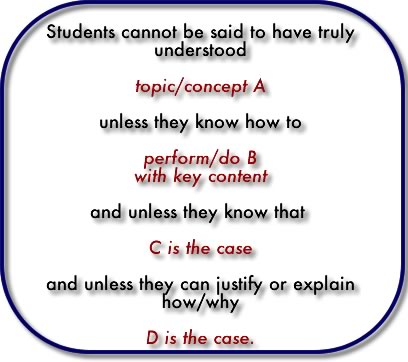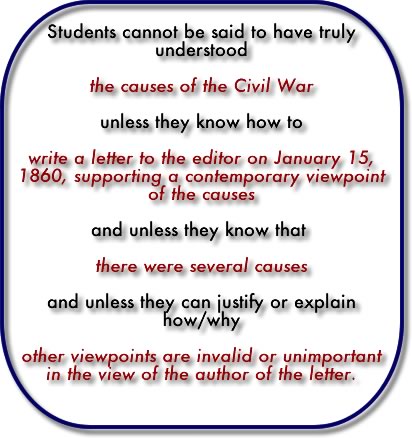References & Credits
Converting to performance assessment
The problem with most attempts at performance assessment is that the assigned tasks don't actually assess the content or skills that their designers hoped they would.
Teacher resources
Area Education Agency 7. Introduction to performance tasks. Retrieved February 29, 2004, from http://edservices.aea7.k12.ia.us/framework/tasks/
Area Education Agency 7. Writing performance assessment tasks: an online guide. Retrieved February 29, 2004, from http://edservices.aea7.k12.ia.us/
framework/tasks/writing/index.html
Carlson, M. O., Humphrey, G. E., Reinhardt, K. S. (2003). Weaving science inquiry and continuous assessment: using formative assessment to improve learning. Thousand Oaks, CA: Corwin Press.
Educators in Connecticutt’s Pomperaug Regional School District 15 (1996). A teacher’s guide to performance-based learning and assessment. Alexandria, Va. : Association for Supervision and Curriculum Development.
Lewin, L., Shoemaker, B. J. (1998). Great performances: creating classroom-based assessment tasks. Alexandria, Va. : Association for Supervision and Curriculum Development.
Marzano, R., Pickering, D. J. (1992). Dimensions of learning: teacher's manual . Alexandria, Va. : Association for Supervision and Curriculum Development.
Marzano, R., Pickering, J., McTighe, J. (1993). Assessing student outcomes: performance assessment using the Dimensions of Learning model. Alexandria, Va. : Association for Supervision and Curriculum Development.
Wiggins, G. Assessment reform: next steps. Retrieved February 29, 2004, from http://www.relearning.org/resources/PDF/Nextsteps.pdf
Wiggins, G. Excerpt from the Relearning by Design Assessment Reform Resource manual. Retrieved February 29, 2004, from http://www.relearning.org/resources/PDF/assres.pdf
Wiggins, G. Task sampler. Retrieved February 29, 2004, from http://www.relearning.org/resources/PDF/task_sampler.pdf
Wiggins, G., McTighe, J. (1998). Understanding by design. Alexandria, Va. : Association for Supervision and Curriculum Development.
Wiggins, G., McTighe, J. (1998).The Understanding by design handbook. Alexandria, Va. : Association for Supervision and Curriculum Development.
For example...
A high school teacher wants to check whether her students understand the causes of the American Civil War. She asks them to "create a skit in which important figures from the period debate the issues." What she hopes to get is a carefully delineated debate, using the historical opinions of the famous dead people. What she actually gets is a series of quotes from encyclopedia articles, assigned apparently randomly to Abraham Lincoln, Stonewall Jackson, and Sojourner Truth.
To avoid this trap, Grant Wiggins designed a simple but rigorous test:

It looks too easy, but if you plug in your data, you'll find out very quickly whether or not your projected project will actually result in the students learning what you want them to learn:

Here's the most important thing:
Such a performance task is not the bonus activity or the activity leading up to the test on the causes of the Civil War. It is the test on the causes of the Civil War.
When to do this kind of thing? According to Cedar Falls, Iowa, Area Education Agency 7's online guide to performance assessment: "Since performance tasks and performance assessment tasks can be time-consuming and resource-demanding, careful attention should be paid to when to use them to measure student performance. Performance assessment tasks are reserved for measuring those standards/benchmarks not easily measured by tests, quizzes, teacher observation, etc. For instance, if you want to know if students use a variety of strategies in the problem-solving process, a performance assessment task may be the best option for assessing their skills. If you want to know if students understand and apply basic and advanced properties of the concepts of numbers, (1) a test or quiz may be a better choice. Likewise, if you want to know if students understand the characteristics of different economic systems, economic institutions and economic incentives, a test or a set of quizzes may be appropriate. On the other hand, if you wanted to know if a student understands the roles the government plays in the United States economy, a performance assessment task may be more suitable."
On the Discussion Boards
Apply Wiggins' device to a performance task of your own design, or check out the Cedar Falls website about performance assessment (especially the online guide to writing one).
Now consider: what role does technology play in such performance assessments? What role should it play? Post your thoughts to the Discussion Board under Fab Five: Performance Assessment.
